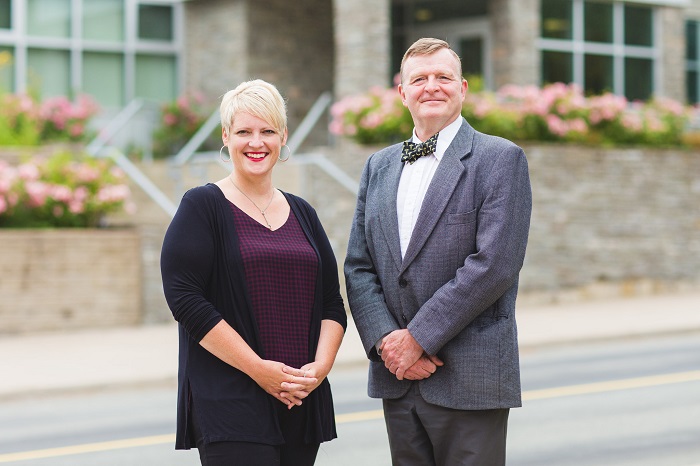» Go to news main
A New Director at the Helm of DMNB's Skilled Clinician Course

A quiet summer day on the DMNB campus is broken by the hustle and bustle of staff preparing for the new academic year. A crucial component to the medical students’ education is their clinical skills sessions. These session have teams of students, under the watchful guidance of faculty, meeting with volunteer and simulated patients to practice the skills they will need to become effective physicians. Skills such as taking a medical history, listening to a heartbeat, and coping with challenging patients.
At the head of the skilled clinician course at DMNB is Dr. Ross Morton who joined the team this past spring. New to the role and to the province, Dr. Morton brings with him a wealth of experience and passion. A nephrologist trained in Manchester and Toronto, he worked in nephrology and general internal medicine for 25 years in Kingston. Dr. Morton is very excited to be focusing on undergraduate curriculum again.
The biggest change to clinical education over the years
Dr. Morton was formerly the clerkship coordinator for the Department of Medicine and later Internal Medicine Program Director at Queen’s University, as well as the vice-chair of the Royal College’s Internal Medicine Examinations. During this time, he’s seen a lot of changes to medical education.
The biggest change has been fostering evidence-based history taking and physical examination. To see what aspects of each can be channeled into a correct diagnosis. “Techniques that are interesting but don’t add to the diagnosis are no longer given the level of importance they once were. A good example relates to a leaky aortic valve. There are lots of physical findings that are fun to teach, but most are not present when the valve is leaking. The fact that you know the 30 or more signs of a leaky valve is less important than knowing which findings help rule in or rule out the condition. The evidence-based physical examination is being increasingly incorporated into the undergraduate curriculum and that is exciting!”
Facilitation & Innovation
What exactly is the role of the DMNB Skilled Clinician Course Director? In Dr. Morton’s eyes he is, “primarily, a facilitator. If others make me feel redundant, I’m doing my job well. To do the job exceptionally well, I have to be an innovator.”
“With respect to innovation, I’m looking at expanding the roles of, and having more engagement with, groups such as indigenous peoples, LGBTQ community, service organizations representing people with chronic diseases, and socially disadvantaged peoples in helping teach and evaluate our students.” The benefits from having students exposed to these groups early in their training not only addresses any preconceptions they may have as individuals, it enables them to explore the issues that are unique and important to each group.
Looking to the future
With the rapid advancements in technology, what does the future hold for the Skilled Clinician Course? Dr. Morton believes the importance of “finding the correct role for patients as educators and evaluators. We are fortunate to have volunteer patients (VPs) and standardized patients (SPs) who have great energy and enthusiasm. It is important for us to figure out how we channel this more advantageously. It is important to emphasize the role our VPs and SPs have as educators and evaluators. Nobody will tell you how a session went better than the person on the receiving end.” He is focusing on not only keeping the human side of the training but potentially increasing the role of VPs and SPs as evaluators.
 Dr. Ross Morton stands with Dr. Stephanie Rutherford, DMNB's Simulated Patient Educator.
Dr. Ross Morton stands with Dr. Stephanie Rutherford, DMNB's Simulated Patient Educator.
Dr. Morton is forward looking as well with respect to the advances in technology and the opportunities they can provide to students. “Finding the appropriate niche for electronic simulation in the undergraduate curriculum. Simulation is being used a lot more for training. Simple models of simulation to more complex mannequins which provide real-time feedback as learners interact. The question that needs to be answered is: what is the ideal integration of this for simulation?”
Success of the Director
When posed with the question of how he views success of his role in three to four years, Dr. Morton candidly replies:
“Students will continue to want to apply to DMNB! When they leave, the students will be committed lifelong learners. They will have a greater understanding how people feel when living with chronic diseases. I would love to see young physicians staying on in New Brunswick, and serving the population of the province. I would like the Saint John community to feel that the Medical School is a place for people to be engaged - a place that is inclusive of all.”
Next Steps
Dr. Morton provides a quick overview of his next steps:
- Faculty development – make sure the tutors have good input and identify their goals as well.
- VP & SP development – is there interest from the volunteers to act as evaluators.
- Engagement with the community - meet with members of volunteer health organizations to gain insight into their needs, and to recruit their members as patient educators for our students.
Interested in Volunteering??
If you are interested in volunteering with Dalhousie Medicine New Brunswick please visit the Volunteer page on our site.
Recent News
- Dal researchers unite to help tackle high epilepsy rates in remote Zambia
- Second year medical student catches attention of top morning show
- Celebrating 10 Years of Dalhousie’s Medical Sciences program
- Global impact: Three Dal faculty recognized in 2024 Highly Cited Researchers list
- Student offers simple skills on how to quickly improve care for people with sight loss
- Three Dal researchers nominated for this year's Public Impact Award
- Dal student triumphs at Falling Walls in Berlin
- One in five kids endure chronic pain. A new pain standard will soothe it
